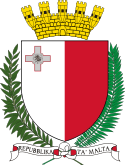- Maltese divorce referendum, 2011
-
Malta 
This article is part of the series:
Politics and government of
MaltaRepublicSubdivisionsForeign policy
The divorce referendum was held in Malta on 28 May 2011 to consult the electorate on the introduction of divorce, and resulted in a majority of the voters approving legalisation of divorce. At that time, Malta was one of only three countries in the world, along with the Philippines and the Vatican City,[1] in which divorce was not permitted.[2] As a consequence of the referendum outcome, a law allowing divorce under certain conditions was enacted in the same year.
Contents
Background
A private member's bill was tabled in the House of Representatives by Jeffrey Pullicino-Orlando, a Nationalist Member of Parliament.[3] The text of the bill, which had been changed twice, did not provide for the holding of a referendum. This was eventually provided for through a separate Parliamentary resolution under the Referenda Act authorising a facultative, non-binding referendum to be held.
The Catholic Church in Malta encouraged a "no" vote through a pastoral letter issued on the Sunday before the referendum day.[4] Complaints were made that religious pressure was being brought to bear upon voters.[5] Around 8 per cent of marriages in Malta are already annulled by the Catholic Church.[5]
Question
Ballot papers had both English and Maltese questions printed on them.
The English version of the question put to voters was as follows:
- Do you agree with the introduction of the option of divorce in the case of a married couple who has been separated or has been living apart for at least four (4) years, and where there is no reasonable hope for reconciliation between the spouses, whilst adequate maintenance is guaranteed and the children are protected?[6]
The Maltese version was:
- Taqbel mal-introduzzjoni tal-għażla tad-divorzju f’każ ta’ koppja miżżewġa li tkun ilha separata jew tkun ilha ma tgħix flimkien għal mill-anqas erba’ (4) snin, u meta ma jkun hemm l-ebda tama raġjonevoli ta’ rikonċiljazzjoni bejn il-miżżewġin, filwaqt li jkun garantit manteniment adegwat u jkunu mħarsa t-tfal?
The question, which resembled the proposal approved by Irish voters in the Irish divorce referendum of 1995, was somewhat controversial. It was claimed that it did not reflect the content of the private member's bill.[7]
Results
Divorce Referendum, 2011 Choice Votes Percentage  Yes
Yes122,547 52.67% No 107,971 46.4% Invalid or blank votes 2,173 0.93% Total votes 232,691 100.00% Voter turnout 72% Source: Department of Information Although for the referendum the whole country was considered as a single constituency, taking into account electoral districts, only three out of thirteen voted "no" to the referendum question.[1]
Reaction and outcome
Discussion on the divorce bill started in earnest soon after the result was announced. In the second and third readings a number of MPs still voted against the bill. Parliament approved the law on 25 July 2011. The law came into effect on 1st October 2011.[8]
See also
- Divorce in Malta
References
- ^ a b "Malta to legalise divorce after bitter referendum". The Independent. 30 May 2011. http://www.independent.co.uk/news/world/europe/malta-to-legalise-divorce-after-bitter-referendum-2290802.html. Retrieved 30 May 2011.
- ^ "Malta to hold divorce referendum in May (AFP)". 16 March 2011. http://www.google.com/hostednews/afp/article/ALeqM5ggvZ-jF8tctPa7jhyr6eQ3oBqWJA?docId=CNG.d73a80696980e3b5a3d31c519ccb3846.4e1.
- ^ Motion No. 206 – Private Members Bill – Civil Code (Amendt) Bill – (1st Reading) – Presented by Hon Jeffrey Pullicino Orlando MP and Hon Evarist Bartolo MP (the Eleventh Parliament)
- ^ "Malta votes to introduce divorce laws". ABC (Australia). 31 May 2011. http://www.abc.net.au/news/stories/2011/05/31/3231202.htm?section=justin. Retrieved 31 May 2011.
- ^ a b "Malta prepares to vote in historic referendum to allow divorce". The Guardian. 27 May 2011. http://www.guardian.co.uk/world/2011/may/27/malta-votes-on-divorce-catholic-church. Retrieved 30 May 2011.
- ^ Writ by the President of Malta dated 28th March, 2011
- ^ "Referendum question does not reflect divorce bill – Tonio Fenech". Malta Today. 16 March 2011. http://www.maltatoday.com.mt/news/national/referendum-question-does-not-reflect-divorce-bill-–-tonio-fenech. Retrieved 30 May 2011.
- ^ "MPs in Catholic Malta pass historic law on divorce". BBC News. 25 July 2011. http://www.bbc.co.uk/news/world-europe-14285882. Retrieved 16 July 2011.
General elections European elections Local elections Referendums Categories:- 2011 elections in Europe
- 2011 in Malta
- Referendums in Malta
- Divorce law
- Maltese law
- History of Malta
Wikimedia Foundation. 2010.
